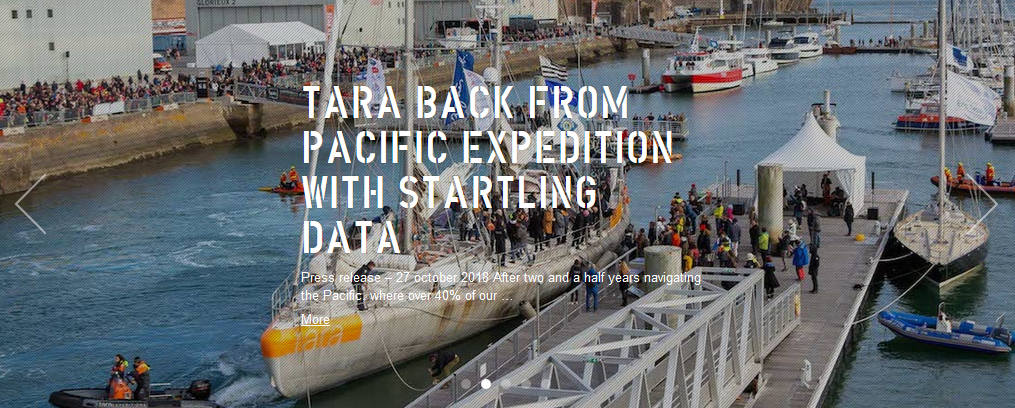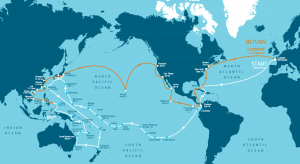Partnership with Mercator Ocean International
As a Tara Expeditions partner, Mercator Ocean International regularly delivers Mercator Ocean and Copernicus Marine Service products to the teams of LOV (Laboratoire d’Océanographie de Villefranche-sur-Mer), TARA’s scientific coordinator for the offshore open ocean. These products are used to develop derivative products for the “Tara Expedition – Pacific 2016-2018” expedition to study coral reef biodiversity in the face of climate change. In addition to this regular service, Mercator Ocean offers its expertise to TARA by delivering coral bleaching indicators and communication materials aimed at the general public.
2-year Tara Expedition finds Extensive Reef Damage Due to Human Activity
After two and a half years in the Pacific Ocean, where over 40% of our planet’s coral reefs are found, the Tara vessel returned to its home in Lorient, Brittany, on October 27, 2018.
Initial observations reveal very diverse reef states due to a varying mix of global and local stress factors. At certain sites, like the Chesterfield Islands, reefs were intact, but global warming has marred those at many other sites, like the Samoan Islands and some islands of the Tuamotu Archipelago in French Polynesia.
With the 36,000+ samples collected, scientists are now carrying out analyses for a precise understanding of corals and their capacity for adaptation to climatic and other environmental changes. Tara Pacific has received support from the CNRS, Paris Sciences et Lettres, the CEA, the Scientific Centre of Monaco, and many other public and private sponsors, including agnès b., the Veolia Foundation, and the Prince Albert II of Monaco Foundation, to name but a few.
Following a course from the Panama Canal to Japan (2016–2017), and then from New Zealand to China (2017–2018), Tara gathered over 36,000 samples from no less than 32 coral reef sites, making its Pacific expedition the largest scientific campaign dedicated to reef ecosystems. After weighing anchor in Lorient in May 2016, the schooner traveled 100,000 kilometers, stopping in thirty-some countries.
Certain reefs badly hit by global warming
Tara scientists made their first observations of reefs damaged by global warming as early as November 2016, at Ducie Island, west of Easter Island. The extent of reef bleaching reached 30% to 50% at some islands of the Tuamotu Archipelago in Polynesia, and as much as 90% at Samoan Island sites in the South Pacific visited in November 2016. In Micronesia, some of the reefs of Tuvalu and Kiribati were already dead by the time the schooner arrived, while those of Wallis and Futuna and the Chesterfield Islands were relatively unscathed.
Poisonous cocktail of global climate and local pollution
Due to reefs’ unique responses to diverse local and global disturbances, Tara researchers found them in extremely different states, forming a patchwork quilt of ecosystem health. Tara Pacific offers scientists the unprecedented opportunity to distinguish the effects of local disturbances (e.g., pollution, urbanization, sedimentation due to soil erosion, and invasive fishing techniques) from those of planetary changes (e.g., global warming and ocean acidification) and evaluate the health of coral populations exposed to both. These initial findings underscore the importance of local sustainable development for the health of these ecosystems, and they show that ambitious sustainable policies and practices are needed regionally even as we confront climate change globally.
Unparalleled data
Through this expedition, the unusually multidisciplinary Tara research team—associating coral reef biologists, geneticists, oceanographers, reef fish and plankton specialists, bioinformaticians, and even doctors—have amassed precious data whose analysis will reveal how corals and their constituent microorganisms function. A study of their genomes should deepen understanding of the mechanisms governing how corals acclimate to environmental variations. This would make it possible to define optimal conditions for ensuring coral survival in light of the environmental and biological parameters affecting coral reefs and the viruses and bacteria of their microbiota.
Employing the same methods of sequencing, data storage, and bioinformatic analysis applied by the earlier Tara Oceans expedition (2009–2013), Tara Pacific will enable researchers to describe coral reef microorganisms and their hitherto unknown interactions. Its team will make an unrivaled coral reef database available to the international scientific community so that researchers can unravel the genomic, genetic, viral, and bacterial biodiversity of reefs.
Giving reefs time to recover so they can withstand successive impacts
In addition to the pressing need for the reduction of greenhouse gas emissions, the Tara Foundation calls for urgent local action to limit direct impacts on reefs. Growing volumes of plastic waste, unsustainable tourism in lagoons, runoff from farming and livestock operations, and large coastal infrastructures are all worsening the plight of reefs. Bigger steps in addressing these impacts may yield results even in the short term.
6 local actions to take now :
- Improve waste management, especially for plastic
- Limit the impact of agriculture, livestock breeding, and associated effluent
- Prevent deforestationto stabilize soil and thereby prevent runoff sedimentation on the reefs
- Ban or restrict the most destructive fishing practices
- Prioritize the environment when developing heavy coastal infrastructures like dikes and industrial ports
- Involve and educate local populations, leading them to preserve their natural environments
Key Figures
Tara Pacific expedition :
- 2 and half years expedition from 2016 May to 2018 October
- 30 visited countries
- 70 stopovers
- 100,000 km of sailing
- 32 sites studied
- 36,000 samples in 2 and half years
- 70 scientists from 8 different countries
- 23 institutions and research laboratories
Coral reefs – assessment
- Coral reefs are home to 30% of the known marine biodiversity
- They cover less than 0.2% of the surface of the oceans
- 57 557km2 of French reefs
- 30 billion dollars per year of provided services
- 50% of coral reefs are endangered
- 25% seem to be in good health
- 20% to 25% have been destroyed
(Sources: World Resources Institute- www.wri.org)
Key MESSAGES AND TEXTS about the Tara Pacific Expedition
- Scientific results to better preserve the ocean and protect humanity
- The Tara Pacific expedition initiated by the Tara Expeditions Foundation and coordinated by the CNRS, the Monaco Scientific Center and the CEA: the first coral reef campaign to be carried out on this scale.
- Tara collected more than 36,000 samples that will enrich the large ocean database, established in 2006.
- Tara’s research opens a new chapter in our knowledge of the Ocean—a fundamental mission of the Tara Foundation.
- This Big Data will help the international scientific community understand how marine organisms are adapting to the serious upheavals currently threatening the Ocean ecosystem.
- The innovative research of Tara Expeditions takes a global approach to understanding global issues.
- “To understand and anticipate, you need knowledge. You have to observe. You need data to inform people and convince them to act”. Etienne Bourgois, cofounder of the Tara Expeditions Foundation.
- “Tara Pacific data and observations will allow us to shed light on the political and environmental measures required to implement change, to transform as quickly as possible those practices having the greatest impact”, Romain Troublé, Director General of the Tara Expeditions Foundation.


